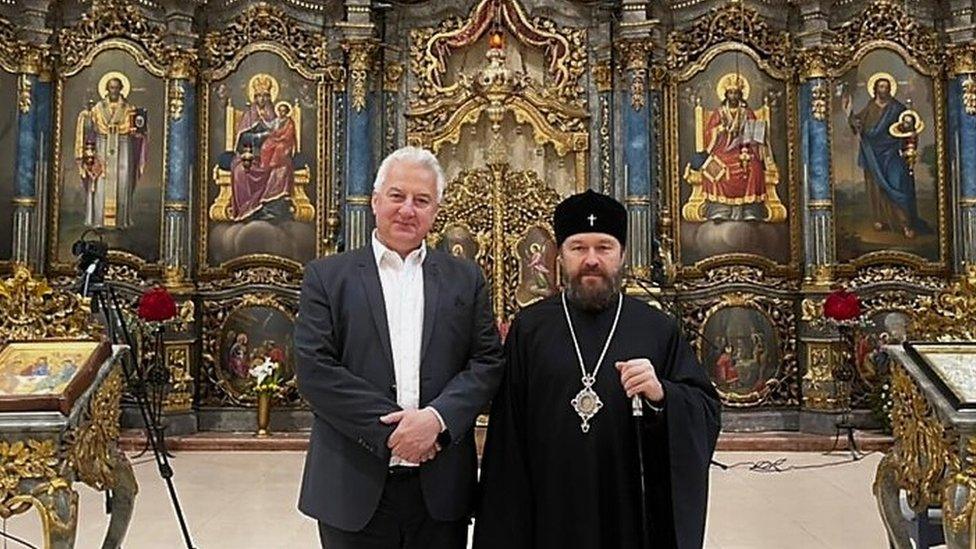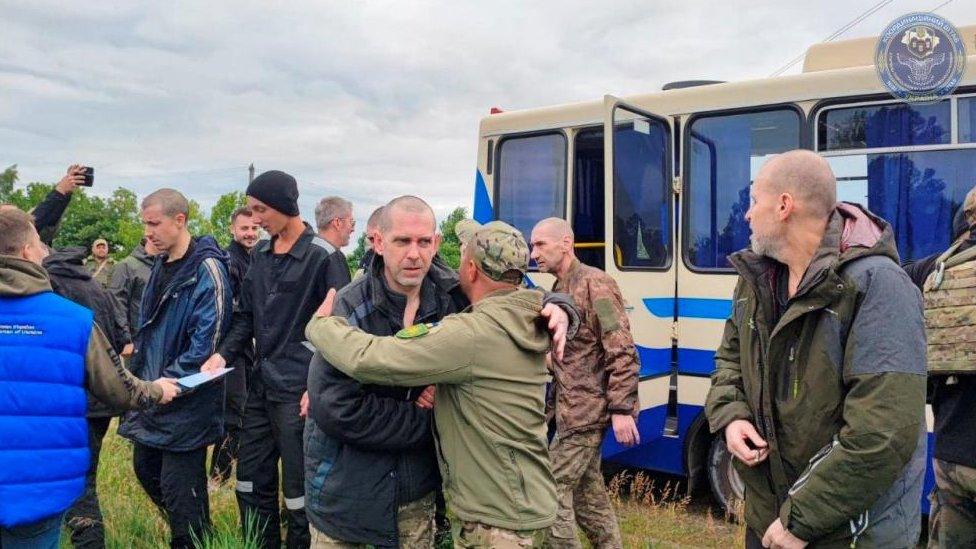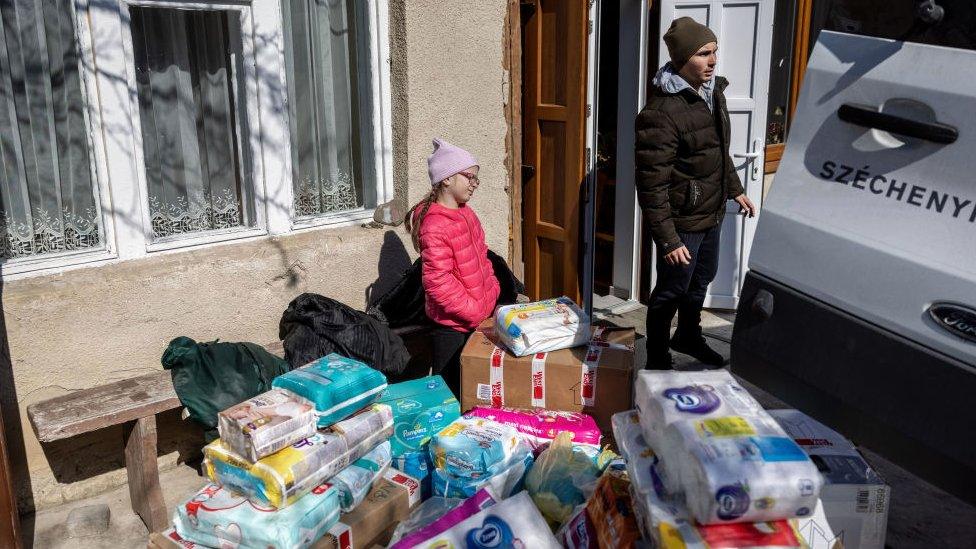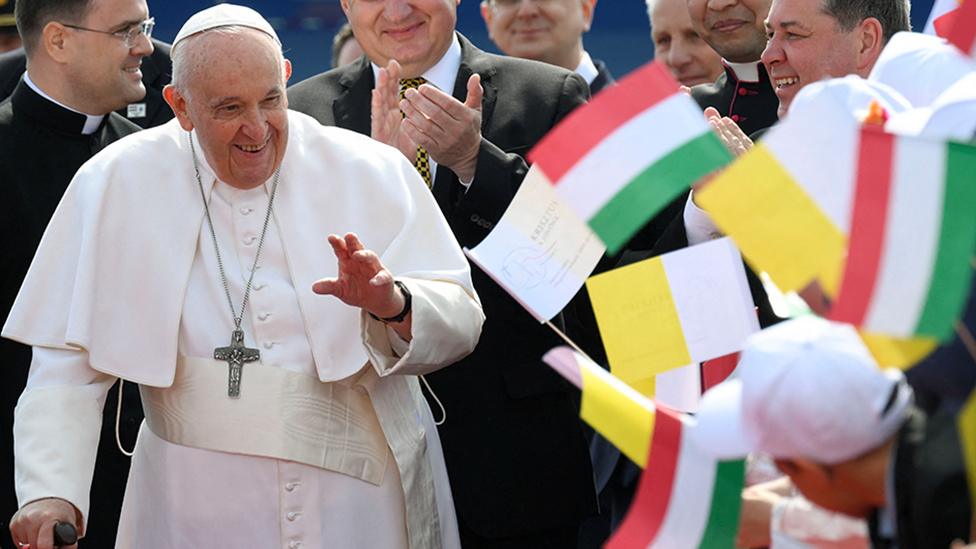War of words over Ukrainian POWs handed to Hungary
- Published

Key to the release of the 11 prisoners was the friendship of the Russian patriarch with Hungary's deputy prime minister (L)
The arrival in Hungary of 11 Ukrainian prisoners of war freed by Russia has provoked a row between Kyiv and Budapest.
Mystery surrounds who they are, how they were seized and what happened when they were spirited into Hungary.
Ukraine says three of the men have now been released and have returned home.
But the two countries are still at loggerheads, with Hungary's foreign minister accuses his Ukrainian peer of making false accusations.
Instead of "lying attacks and getting personal", we should be happy about the freedom of the 11 people, Peter Szijjarto complained.
Relations between the Hungary and Ukraine have been strained throughout the war. Hungarian Prime Minister Viktor Orban is the only European Union leader to have maintained relations with Russia's Vladimir Putin.
The release of the Ukrainian soldiers - who are all ethnic Hungarians - into Hungary, could have made things better, but it has only made ties worse, and diplomats are lamenting a missed opportunity.
The fog that has enveloped this case can be largely explained by the fact that both foreign ministries were kept completely in the dark.
The key to their rescue was the personal friendship between the head of the Russian Orthodox Church, Patriarch Kirill, with Hungary's Deputy Prime Minister Zsolt Semjen. Another key player in the prisoner release was the Hungarian Maltese Charity service.
In a statement dating back to 8 June, the Russian patriarchate spoke of the prisoners of war being transferred to Hungary following the Church's mediation "within the framework of inter-church cooperation, at the request of the Hungarian side".
The soldiers are described as being of Transcarpathian origin, an area in the far west of Ukraine with a large population of ethnic Hungarian, Romanian and other minorities.
The following day Mr Semjen announced on his website that the prisoners had been brought home, thanks to his "human and patriotic duty".
Many men from Transcarpathia have volunteered or have been conscripted into the Ukrainian army. Others have fled the war, by swimming the River Tisa or crossing the mountains on the western borders of Ukraine.
Until 1920 Transcarpathia was part of the Austro-Hungarian empire. A plausible explanation for the lack of information may be that the men do not want to return to Ukraine, but there has been no official comment to suggest that.
"All attempts by Ukrainian diplomats over recent days to establish direct contact with the Ukrainian citizens have failed," Ukrainian foreign ministry spokesman Oleh Nikolenko said on Monday.
"This, as well as information received from the relatives of some of them, indicates that the Hungarian authorities' assurances of the alleged free status of Ukrainian defenders in Hungary are not true. In fact, they are kept in isolation."

Russia and Ukraine have been involved in periodic prisoner exchanges since the full-scale invasion began last year
The Hungarian government hit back.
"The Ukrainian government was informed," insisted Gergely Gulyas, minister in charge of the prime minister's office.
He even cast doubt on them being seen as prisoners of war as they had been freed in Russia before being handed to Hungary.
"They can also leave the country at any time of their own free will, we do not check or monitor them."
On Tuesday evening Mr Nikolenko announced on Facebook that the Ukrainian embassy in Budapest had managed to bring three of the Ukrainians back and it was continuing to take active measures to return the other men "taken out of Russia to Hungary".
The war of words between the two neighbours goes back to 2016, when a series of Ukrainian laws drastically reduced the teaching of Hungarian and other minority languages, including Russian, in Ukrainian schools.

Hungary has sent humanitarian aid to Ukraine, including here in Transcarpathia
Since Russia's full-scale invasion of Ukraine, the Orban government has rankled Kyiv by distancing itself from Western solidarity with Ukraine.
Budapest has sent large amounts of humanitarian aid and has helped hundreds of thousands of Ukrainian refugees, but has refused to join other EU and Nato countries in supplying weapons to Ukraine.
Ties with Russia are so strong that Hungarian Foreign Minister Peter Szijjarto attended last week's International Economic Forum in St Petersburg - the only serving EU politician to do so.
He regularly holds talks with Russian Foreign Minister Sergei Lavrov and with the heads of the Russian nuclear and gas companies on which Hungary depends for its energy supplies.
Russia and Ukraine have taken part in occasional prisoner exchanges since February last year, but last week 22 Ukrainians went on trial in southern Russia accused of involvement in a "terrorist organisation".
Ukraine said abuse of combatants, including women, was disgusting and amounted to a war crime.
Related topics
- Published22 January 2023

- Published28 April 2023
